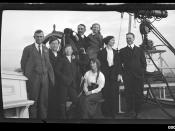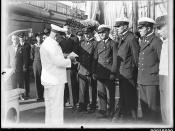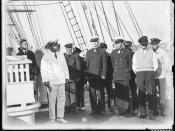Critical Analysis of the, "Secret Sharer"
In 1890 Joseph Conrad visited Africa, where he got the inspiration for a book he wrote later in 1907 called the Secret Sharer. Years later, Albert Guerard wrote an ethical review, analyzing the book as a psychological study of self identification. Through out the years, scholars would argue that Leggatt was a just a figment of the Captain's imagination.
"The story is a drama of consciousness and conscience, symbolic explorations of inward complexity." (Twentieth-Century Literary Criticism, Vol. 13 p103) Albert wrote these words to prove the journey of childhood to adulthood, as the unnamed Captain took that step after meeting Leggatt. Albert felt Leggatt was the adult, staring the child, played by the Captain, in the face.
A major childish factor of the Captain was his morality, being extremely careless as he let Leggatt, a common killer, stowaway on his ship; although the Captain's morality could have be affected by the fact he was on a ship and not on land, as land being a whole different world to sea men.
Albert supports that Conrad's indifferent moral symbolism, "...thrust inward toward psychological complexity and outward toward moral symbolism," (Twentieth-Century Literary Criticism, Vol. 13 p103). This sense of different morality gave a more modern feel at that time, meaning breaking the rules back then were easier than they are now. Breaking the rules was not really breaking the morals, as many; try to compare laws and moral.
Morals are more like ethics; the unspoken rules which people follow but don't really have to, unlike the law, people follow it because most are afraid of the consequences. Captain Archbold is the man, who readers are led to believe, let Leggatt escape; fearing the consequences, Archbold tricked his crew in to pretending that he...


